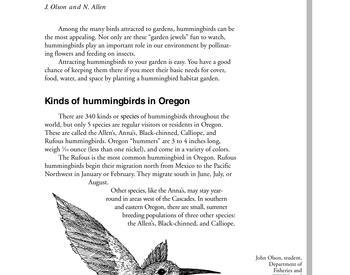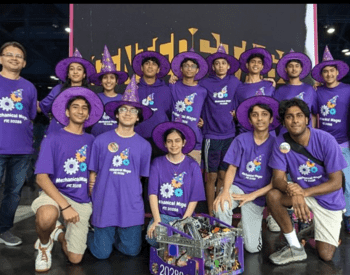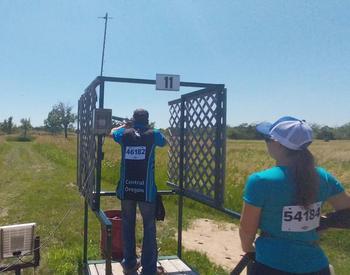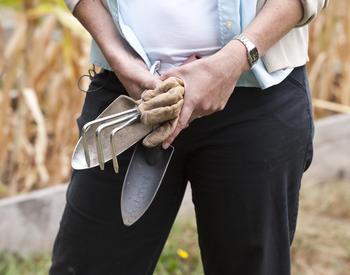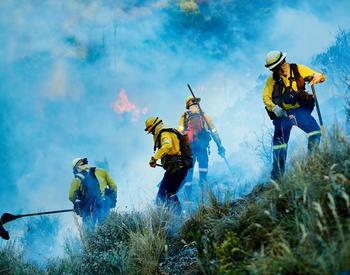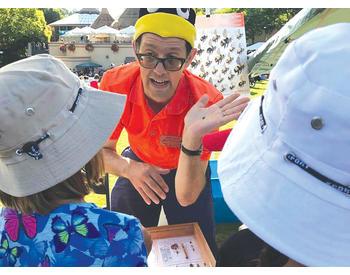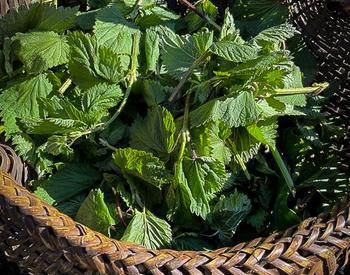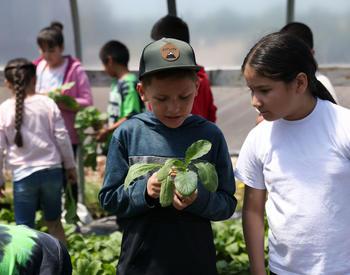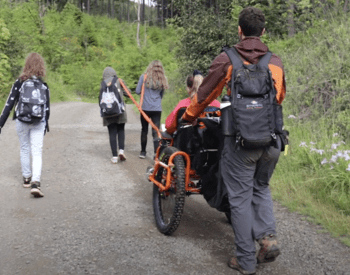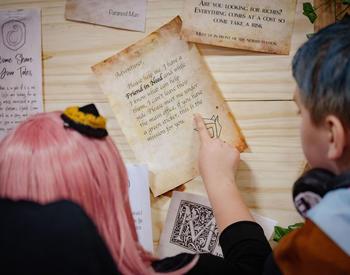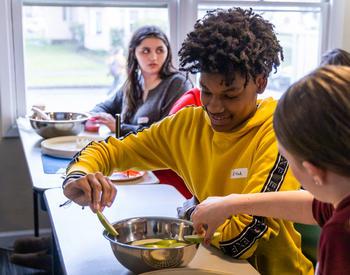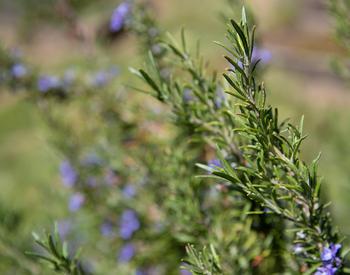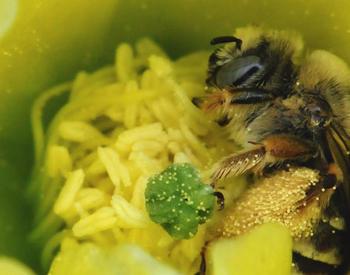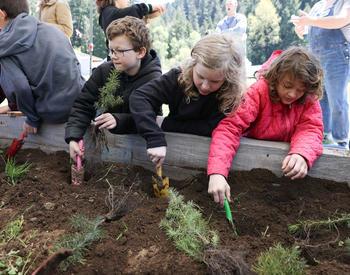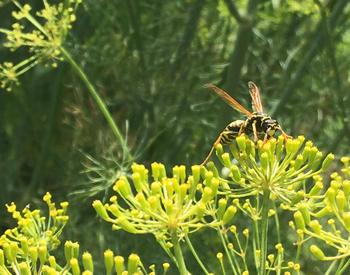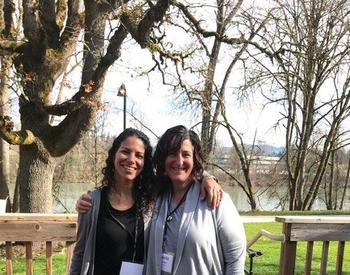Transcript
Speaker 1
From the Oregon State University Extension Service, this is pollination, a podcast that tells the stories of researchers, land managers and concerned citizens making bold strides to improve the health of pollinators. I'm your host doctor Adoni Malapropos, assistant professor in pollinator health in the Department of Horticulture. K through 12 educational and insect pollinators is really poor in the US and this was exemplified, if you remember one of the early episodes of the show with Joseph Wilson, where most people really underestimate the species diversity of something like bees. Now this is a particularly difficult problem to solve because teachers lack the experience and there just aren't teaching. Tools available in the classroom to give students a rich experience with insect pollinators, and that's why I'm so excited to have our next guest, Megan Swanson. And she's the program manager with the Bcos project, which is a not-for-profit that has focused on a number of things. But one of the key things they do, they install observation honeybee hives in schools around the US and beyond. And so students get a real, tangible experience of bees, which can connect up with larger stem learning objectives. But really. Provide some basic literacy on insect pollinators in our schools and for those of you who think bees and schools, that doesn't seem like a great idea. It's good to point out that the Oregon School Garden network has about there's about two dozen schools that already have honey bees. A number of schools have Mason. These there are already educators out there who are really blending bees and pollinators into their curricula. It's a great episode to give you some ideas on how you can join them in getting some fundamental education on pollinators, into our schools. Hope you enjoy the episode. Welcome to pollination.
Speaker 2
Thank you. Thank you for having me today.
Speaker 1
Now can you just set up the episode? Tell us a little bit about the challenges facing students and educators in the US today when it comes to pollinator literacy?
Speaker 2
Yeah, absolutely. Challenges facing students and educators in the US today when it comes to pollinator literacy center, largely in our opinion, around a general disconnect from the subject. In hand, for example, how many times do we look at a plate of food and think to think our pollinators or the place that it has come from or we think about them at all. So there's a well traveled statistic that one in three bites of food is due to the work of partners. However, almost all of our food, indirectly or directly, comes from an environment where pollinators add to the quality, taste or amount that could be produced. So students can't feel or find a connection in that tangible way. Instead of reading through a textbook that makes it a little bit more difficult, but when you put it in front of their eyes and ears and allow them to hear the. Hum of the. Honeybee and gain a bit of ownership over the high success when you're to build a bridge.
Speaker 1
That's fantastic. And I guess that's a great lead into my next question because I think this is what beat the because project is really designed to do. Can you tell us what prompted it, what and how did you kind of sort of deliberately at the beginning sort of see yourself as addressing these?
Speaker 2
Yeah, absolutely. So the be cut project started as a conversation between Tammy and right, our director and beekeeper and Ted Denner, the owner and founder of the 70 company of them are beekeepers and friends. And they were wondering how they could provide opportunities for their own children to connect more with their environment. So they started off and installed their first observation hive. They really hit the ground running in a local school in the Charleston, SC area. And the rest is kind of history. Since that initial highs, the because has partnered with a lot of really, really wonderful decade answers and we provided over 450 grand. To programs in all 50 states, Canada, the Bahamas and Puerto Rico to date. So that's been a lot of fun.
Speaker 1
Oh great.
Speaker 2
OK.
Speaker 1
OK. So just back you're gonna need to sort of explain this program, so it's funds, but also you talking about it starts with beehives, just kind of walk us through the different programs like how if I was a school or something and what kind of programs would be available through Cos?
Speaker 2
Yeah. So First off, all of our programs are available to any nonprofit or school who wishes to build a B program, and it helps to understand what that is in order to understand the diverse programs that we. Provide so AB program is where we want to help build the buzz on your campus or organizational area and have teaching tools available to get your toes wet with either a Lesson plan that centers around monitors and its core compliance, or those who are ready to just totally dive in and welcome live fees on campus. So the B program can be really anything you want it to be. So we start there and then we begin with assessing the current needs and learning environments of each program. We begin with encouraging educators to start with the because curriculum and build that foundation of knowledge at their school, you generate buzz for lack of a better word, and you really get the student population excited and enthusiastic about pollinators through bringing in beekeepers, local experts. And then you can welcome. An actual hive with live bees, if that is allowed on your campus and welcoming live bees, that can seem a little unusual. However, we've just seen absolute enthusiasm and nothing but support from our program. That really adopt these principles observational learning. It's the benefit, they're. The benefits are infinite, and we've just seen such successes with that. So all of our programs are surrounding that observational learning, whether it is a Lesson plan that takes your students outside and those are available on our website, on the resources page. Or if you want to apply to the grant program which is called the B grant and that opens every September, our largest partner is the whole foundation and they help us to provide the B grant and that application opens in September, closes in October and that's where you can apply to. Receive a fee grant for your nonprofit or school.
Speaker 1
Great, that's a lot. Maybe let's just go through a few of those parts, so. The getting bees on campus, I imagine, is a complicated thing, but I do for people in Oregon who are interested. You can Oregon Department of the School Garden Network program has an Oregon Department of Education.
Speaker
Yeah, totally.
Speaker 1
Portal and you can see there. There's you know there's 20-30 schools around Oregon that have honey bees on site. But it is a tricky thing, I imagine for a lot of schools, there's the trepidation of safety. Yeah. So tell us. Yeah. Tell us a little bit about how that gets negotiated. Cuz I imagine after the bees are in in people are like oh, this works fine but. That at the outset, it's people have come.
Speaker 2
For sure. And we find that education is really the key to welcoming live fees on campus, as education is the key to a lot of things. So a lot of people don't know that the pollinators or insects that they might be more wary of, such as the yellow jacket, because they can be tricky little guys and girls. Those insects are not honey bees, and that's the first conversation we start with, which might sound money, but we begin to educate the larger school community, including parents. We have templates for letters to parents, letters to educators, and we create safety plans and get the students involved. So that bounces back to building that foundation and building that friendly rapport about talking about bugs and insects. It really starts the conversation. Moving forward and then the more logistical side of things we need to work with an administration or the Superintendent of your school district, for example, we've done this several times before. There's over 450 programs. So if we need someone regionally to connect with another program. Has already been approved. They've had difficulties working with their insurance but have overcome that and really educated everyone about the benefits. Of these hives. We really like to connect everyone, someone in their local community who's done it before. We're lucky that the because network is building and there's almost always someone in a close radius who can provide advice or a shoulder to lean on. If the if the road seems a little difficult at the time. UM. But we do a pretty good job of filling the. Benefits of these teaching tools.
Speaker 1
That's really impressive and what I what I really and really thought out. I really like how when you started with that answer just the way in which it really is about all those all those people get engaged, the students, the parents, the administrators really kind of. And that safety plan up front, just showing that this has been thought out, this is deliberate. We've done this before yet that is, this is not, there's not a lot of risk involved that you can have.
Speaker 2
No, and we're very intentional. Exactly what you said. We're very intentional. With the way. We introduce these ideas like these are not for every campus. They're very exciting and they're a wonderful teaching tool. But we do offer other ways to enjoy pollinators and bees in your curriculum and your regularly scheduled existing curriculum. But we do like to encourage everyone to just start with those tiny teaching moments and connect with everyone in their community to learn that be for it. Very far away from their hive. So if you see a bee on campus, it might not be the B from your hive. And that in itself really opens doors. That tiny fact to welcoming a lot more knowledge about what type of bee you're seeing around you. Is it from this hive and then it. Just opens up. So much.
Speaker 1
I imagine they're educators whose ears perked up when they heard that there's a grant that they can apply for what's tell us a little bit about that procedure and what the what qualifies into the grants.
Speaker 2
Absolutely. We are very excited to offer every year. It is called B Grant and that is offered in tandem with the whole kids. So I know super creative name guys that is offered every year in September and it is offered in tandem with the Whole Kids Foundation. So they graciously sponsor several bee grants every. Year this year they're sponsoring 100B grant program so that those grants include are an option to receive an observation hive. A traditional outdoor hive or a monetary option so you can create your own experience with live bees on campus, whether that's native bees, creating a bee sanctuary for existing hives, and so on. So if you are an educator or a leader in your own community, whether it's a Nature Center, museum, library. And you can. Apply it begins around September 1st of every year. And the application closes at the end of October. So we make those decisions around December and then the equipment is shipped out in January, just in time to set it up and welcome your bees, depending upon your location in the spring. So we see a lot of bee festivals.
Speaker 1
OK.
Speaker 2
Then a lot of very, very fun and creative school community welcome board welcome activities when they welcome their views every spring. It's a super fun time of the year for everyone involved.
Speaker 1
Well, fantastic. I'm sure there's going to be a lot of calls from the Pacific Northwest after this episode, but let's take a ohh. Absolutely. Yeah. No, I think this is this is really great. And there's a lot of interest I know from extensions perspective. We get a lot of calls from educators who really especially like.
Speaker
We hope so.
Speaker 1
Grade two and grade four. I don't know what it is about those two grades, but there seems to be, it seems to be coming into science curricula a lot. And they really need resources. So, this is, I can just imagine I'll be directing people to listen to this podcast. It's like. Well, here you go.
Speaker 2
Wonderful. Yeah. And just so everyone does know each grant program you are required to partner with a local beekeeper that's not only to increase the connections and network within your own community and build your hive, pun intended. But we do. That is in order to help manage that hike throughout the year. So, in that. Application process. If you think you might be interested in applying for next year, just think about who you might connect with in your own community, who is the beekeeper or beekeeper association?
Speaker 1
Oh, and I may just hear a plug, Tammy. For those of you who are educators and don't know we have a master beekeeping program here in. Oregon and those are well trained volunteers and they do need volunteer hours. So, if you do, if you are contemplating your grant, definitely reach out to the Oregon master. We'll put a link to put all the links in the show notes, but that. That's an opportunity too. Pair with the beekeeper. But I also really love that angle because I think one of the spirits of some of these. School Farm programs are connected. Coming back to your real life, you start off like people's connection to food, making it more tangible, and part of that I guess is, you know, meeting the beekeeper.
Speaker 2
Yeah, exactly.
Speaker 1
OK, let's take a quick break and we'll come back. I want to hear a little bit more about getting involved and also maybe some examples of somehow this rolls out with some schools.
Speaker 2
Looking forward to it.
Speaker 1
OK, welcome back. So, tell us about some examples of how this has been implemented at some schools. I'm sure you've got lots of stories of successes and impacts. Tell us a few stories.
Speaker 2
Yeah, absolutely. This is our favorite part. Getting to brag on all of the vagrant programs and trying to make sure everyone knows how fun it is. And it's not just the fun. This is because it is making great strides in programs, but more so the grant recipients are making fantastic strides in their own communities. Towards helping bees and pollinators of all types. So, I'll just, I wanted to share about if we don't have a favorite program, but we do love to brag on aboutl of our programs since we don't have enough time. I'll start with a local, a program local to Charleston and this is at an All-girls school called Ashley Hall. They are one of our longest running fee programs. They received the bee grant several years ago. They already had live fees on campus, and they are actually located in the downtown peninsula of Charleston. So, it does qualify as urban beekeeping. They now have an observation hive, a top bar, rooftop hive, and several traditional hives, so I know they are just rocking it at the school and these ladies work with our tinier creatures, the other ladies, and they have.
Speaker 1
Oh, my goodness.
Speaker 2
Implemented pollinator education beginning in the younger elementary. Goals and then those same students are given the opportunity when they get older to be club and this be club is fully it's completely student. They have a teacher who assists, and they begin managing the hives on campus, so they harvest honey, they watch for pests. They observe environmental effects on the hives, the differences between keeping in a hive and an urban area versus elsewhere. It's pretty fantastic to see these young women not only managing beehive. But also seeing themselves with their surrounding environment. So that. A great opportunity for not only their traditional curriculum, but also for the extracurricular and getting involved outside of school.
Speaker 1
I really like that example with the idea of like starting an elementary school with the basics and then having a big club that you can graduate into the continuum that you're really kind of like by the time you joined the B club you've had, you know, some of the you've become familiar with them. That's a great model. I like that.
Speaker 2
Yeah. We really encourage a lot of our schools to grow their structured programs that way and everyone starts at a different point depending upon if it's an elementary, middle or high school or well beyond. That we work with. All ages of educational opportunities. Fortunately, Ashley Hall has. A wide range of. Grade so they can work a little bit more. Training younger students and then the older students can get into the hives. We also have another program where high school students go into local elementary programs and teach what they have learned. So, it's really applicable to a lot of different learning. Opportunities that way and it helps you to connect with your local educational community, which younger elementary school doesn't want to hang out with. The cool older kid. You know.
Speaker 1
I heard I was talking with one of the teachers at Amity School here in in Oregon, near McMinnville, and it was something he told me something similar to that. With that, they've a horticulture program and just the way in which the older students can do this peer teaching to the younger students, and it can be very effective. I never thought about that, but that's A and it gives them. Experience as well as the older students. Teaching what they know, yeah.
Speaker 2
Also, sure and it gives them experience teaching and just little learning level that you can learn so much from the bees, but also, they provide great opportunities like public speaking. I myself am very nervous about public speaking. It doesn't come naturally to me but within the. Tinier opportunities to teach younger students? You start implementing these tools that really help in everyday life. So, the bees, the bees, just. Keep on giving and giving.
Speaker 1
You have a couple more examples, I think.
Speaker 2
Yeah, for sure. I would go on. For this stuff, one of our other programs that we've been working with lately is located in Puerto Rico and there is an organization called the B of B initiative in San Juan PR and an incredibly accomplished young woman began this initiative. As a way to educate her fellow students and community members about honeybees, particularly after Hurricane Maria devastated the island. Her message expanded to show pollinators provide vital pollination to Puerto Rican crops and assist in other industries, which is not only interesting but important for island educational communities to understand and grow. Community members who know. What role do these pollinators play when they're rebuilding certain areas? Her school has an observation hive. They received it through the B grant program, and she also works within the community alongside the Bob Volunteers. To really promote the message and assist other schools to apply for the B grant, create bilingual teaching tools. Work with local beekeepers. They are just they are super busy, and the program has expanded and into something we really couldn't imagine beginning with. And we're just so proud of it. Her and the St. John's School in San Juan. It's been fantastic.
Speaker 1
I guess that's a great example of how schools can also be community learning centers, and I've thought about this with some of them, you know, we have schools in, you know, not in the urban center sometimes where they are community hubs. And here it seems a great example of the school program also having this larger impact outside the school.
Speaker 2
Yeah, definitely. Or if you have a hive at a. Library. We have several library hives, whether they're in a study room or they're level or bodies of the library and. We had a couple librarians at the Georgia Library Conference that we went to this past. All, and I love their message about any librarian loves when there is a car in every single parking spot or they have their library just filled to the brim with community members and one of our specific library programs, and Hancock County. There has been so much ownership by the Community over this time. The entire Local Keepers Association takes care of the Hive, not one, but many. And what better message about that bees could give to us other than the power of teamwork and coming together as a community? And now that whole beekeeper association uses the library for their monthly meeting. So, it's really, it's really been a wonderful community effort. I would, I would brag on that program all day long. They always have such wonderful ideas about the queen, which they ended with honey. So, it's been really wonderful to witness.
Speaker 1
You know what we should do is that I bet that there's a lot of beekeepers on this who are listening to this episode say ohh observation. I know exactly what you mean. But I imagine educators walk us through what the observation hive is and how your observation hive is structured for educational purposes.
Speaker 2
Yeah, that's cool. Absolutely. So, our observation was highly equivalent to an 8 frame, 5 body and we arranged them in a vertical manner. The heads are fully plexiglass. In there is an exit tube and we suggest the tube being no longer than around 4 feet normally it's. Very short. This exit through an exterior wall. And then the exit area, we make sure that wherever that is, it's in a low traffic area or you can put up right around it. So, these hives are, if you flip the TV on their side that's the B TV and we also provide through the grant program. Quilted cover that's made locally and that quilted cover allows for the darkness and a little bit of insulation. For each hive. So, when you're not observing, you can put that cover over it for any of our listeners or listeners out there. The beehive is traditionally in a dark space. It's in a tree or a hole in the ground on the side of the house, or in a traditional beehive. It's very dark inside. So that just helps it out. But you can view and observe at any point during the day, and they are they are always active, they're always buzzing.
Speaker 1
And I suppose the great thing is just one kind of technical thing. So, it's 8 frames, so it can't be 8 frames tall, is it? It's 4 frames and four frames side by side. Or is it 8 frames tall?
Speaker 2
So, there's two frames. No, it's. There are two frames at a time. So, you would have 222 and two, and they're sandwiched together so that the queen is normally on the inside. We do lots of cleaning every once in a while, in our observation time. Normally when they're bustling.
Speaker 1
OK.
Speaker 2
In the spring in the summer. But yeah, there's still allows for them to generate more warmth. I do like to mention in the winter with a lot of our grant programs, we do suggest in colder areas, which we don't experience as much in Charleston, SC, we're a little a little heated down here normally, but. In our colder areas, we do suggest we put the bees and work with your beekeeper to over winter them in a local bee yard or a beery since it's easier for bees in colder climates for winter. A more traditional setting where they can regulate their temperature. And we provide teaching tools like little learning frames that have high-res images with lessons and suggestions on top. Of them. So, you can. Hang those in the observation hive during the colder months.
Speaker 1
Oh great.
Speaker 2
And then the. Bees have a more naturalized habitat to overwinter.
Speaker 1
And there must be the excitement of, like, one of the bees coming in.
Speaker 2
Absolutely, that's what that's our favorite part. You can welcome the bees back in the spring if you're a library, you have a little bit more year-round availability to witness seasons and how that affects the hives. And then in the fall, you can have a little bit of a honey harvest festival. You can group up with your local farmer's market. There is really endless flexibility as to how to connect with them. Community on these programs. But they added the seasonal changes of the hives provide lessons in their own right to see what they're doing at any given point throughout the year.
Speaker 1
And just, I mean, these are really great. I remember someone saying that the only Nobel Prize that's ever been awarded to an entomologist was done on one of these observation hives, Karl von Frisch. This is what you can do. You can do very basic things with young students in them just observing the difference. Tests the different developmental cycles, but you can do pretty complicated, you know, AP level work on an observation hive.
Speaker 2
Absolutely. And I didn't. Know that about the Nobel Peace Prize? So, I will have to look that up after, after today. And yeah, we. Our hives are large. Our grant programs are largely for students and organizations who benefit students in K through. Well, because we understand that creating environmental stewards and creating that next generation of environmental stewards, that doesn't mean that you're in your high school. That could mean that you are an adult our age who is interested, but you just never know. And we really like to promote this education. At any age. And that's why the observation hives are so great. I don't think I've ever seen it. A sparkle in someone's eyes and until I seen him look, look into an observation hive as an adult or a child and understand the magic. It's really, it's contagious. The enthusiasm is absolutely contagious. And then once you get that enthusiasm, you want to take a beekeeping. Worse, or go home and see if your home is pollinator friendly. Little moments like that really add up. So, I think that message in itself is absolutely not healthy praiseworthy.
Speaker 1
Well said. Well, let's take another break and we'll come back. I have a couple of questions I ask all my guests the same questions. I'm interested in. What your answers are going to be. Alright, we're back so.
Speaker
These are the.
Speaker 1
Questions I ask all my guests. I'm not picking on. You or anything. So, the first question is do you have a book recommendation?
Speaker 2
Thank you. Yes, absolutely. This was difficult for me. I love to read. So, I have one that's specific for K through 12 educations. I think I've enjoyed anyone and I'm beyond the age range, but they're called bees. Honeyed history, and the author has done such a wonderful job of encapsulating the vast reach.
Speaker 1
OK.
Speaker 2
Of the message of bees in history, science, technology and the. Permanent it is not. A long book, but it is so colorful, and it goes from. The symbolism of bees and all cultures to the stories and history like Alexander the Great and really are so intricate, involved in our own story. So that would be my first option and then my second option is 1. That is a personal favorite called honeybee democracy by Tom Seeley, a professor at Cornell University. And I would assume that you know that. This one as well. It's a favorite among beekeepers since Tom is such an advocate of beekeeping research and education. Tells how Beehive can teach us. How larger communities can work as a whole to make decisions together. So, I think that's a good lesson in every respect. And then he backs it up with research. Which is always wonderful.
Speaker 1
How do you be? Democracy is much recommended on this show and I, but I don't know. I think Tom would be very pleased to hear it sort of spoken about in terms of, you know, educating, educating people across the United States who are going to going to school and stuff. I think I think it would be. An awesome connection.
Speaker 2
100%.
Speaker 1
OK, so go to the tool. Is there a tool that you, you know, find indispensable or you really want our listeners to know about?
Speaker 2
Yeah. So, our number one tool that we're known for is the observation hive. However, I want this to be applicable to everyone. So, it's outside of the box. Outside of classroom, but our number one tool, aside from the observation hive, is your campus. Whether you are in school or you're at a Nature Center, a museum, a library, there are always grounds surrounding that campus. If you're in an urban area, you could go to a park close by and we have an activity called the Community Mapping Lesson plan. And what you do. As you assess bacteria at any age can do this depending upon your age or educational level, you can get more involved. That you can map how pollinator friendly that area is in terms of pesticide usage. If you have a water source. If you have a pollinator friendly plant for every season of the year you can take your students and walk around the campus, draw a very rudimentary. Yeah, if you're. Me and then your sticker your marker the. Crayons to really draw a picture. Of how bees would. Be your campus or any pollinator for that matter. So go outside. That's the number one tool that I would suggest is the areas right directly around you on a sunny day.
Speaker 1
That's a great that's a great tool, and I often think with, you know, with school garden programs, you know these, they're already on campuses, these really these resources that have been put in and they're become a very rich learning environment. It's kind of I like the way they're paired with the observation because it really does, you know, forces you to look, it is hands on, you're looking at real landscapes rather than a book or something. That's a wonderful suggestion.
Speaker 2
Yeah. And everyone has access to the areas directly around them. So, there is no cost. To walk outside.
Speaker 1
OK. Our last question is, do you have a favorite pollinator and maybe honeybees, but maybe you have told us what your favorite pollinator is?
Speaker 2
That's such a difficult question because I think they're all wonderful. They're pollinators that bring us chocolate. There are pollinators, like the honeybees that do so much, but don't tell the honeybees that I think my favorite pollinator. As of late. It should probably be the monarch butterfly. It's a. Silly reading a little bit of sort, but I was re reading a book by Rachel Carson about Rachel few and she noted how they were source of inspiration to her and how 1 Butterfly does not make the entire migration S but a whole host of butterflies work together to make that journey as in several lifetimes. And I think that message is. Very similar to the bees and their hives, we can learn so much from communities working together towards a common goal and. That's just everyday magic, if you ask me, so I've really been enjoying watching, watching the monarch, where it got a little chillier.
Speaker 1
Mastic. Well, thank you so much for taking the time to tell us about the project. I'm really excited to introduce the project to people who didn't know about it in the Pacific Northwest region. Thank you so much.
Speaker 2
Thank you for having me. And if anyone wants to get a hold of us, you can reach us at [email protected] or on our website at the bcause.com.
Speaker 1
Oh, and we should mention your website if you know the website, it has been revamped. It looks really nice.
Speaker 2
Thank you. Thank you so much. We're excited about it.
Speaker 1
Thank you so much for listening. The show is produced by Quinn Sin and Neil, who's a student here at OSU. In the new media communications program, and the show wouldn't even be possible without the support of the Oregon legislature, the Foundation for Food and Agricultural Research, and Westerns, Air show notes, with links mentioned on each episode are available on the website, which is. At tollnationpodcast.oregonstate.edu. I also love hearing from you, and there's several ways to connect with me. The first one is you can visit the website and leave an episode specific comment. You can suggest a future guest or topic or ask a question that could be featured in a future episode, but you can do the same things on Twitter, Instagram, or Facebook by visiting the Oregon Bee Project. Thanks so much for listening and see you next week.
Literacy on pollinator biology and ecology in the US is poor. But schools can be skittish about insects, especially bees, and teachers lack resources to make pollinator education come alive. This week we hear about an initiative that to get around these obstacles – The Bee Cause Project.
Megan Swanson currently serves as the Programs Manager for The Bee Cause Project, an organization with the goal to create the next generation of environmental stewards through the lessons of our friends, the honeybees. She is a beekeeper, writer, and environmental advocate with the intention of helping people reconnect with their environment.
You can Subscribe and Listen to PolliNation on Apple Podcasts.
And be sure to leave us a Rating and Review!
Links:
- Bee Cause Project
- Observation Hive
- Karl von Frisch (The Dance Language and Orientation of Bees, 1967)
Megan’s Book Recommendation: Bees: A Honeyed History (Piotr Socha, 2017), Honey Bee Democracy (Tom Seeley)
Megan’s Tool Recommendation: Campus habitat
Megan’s Favorite Pollinator: Monarch Butterfly
